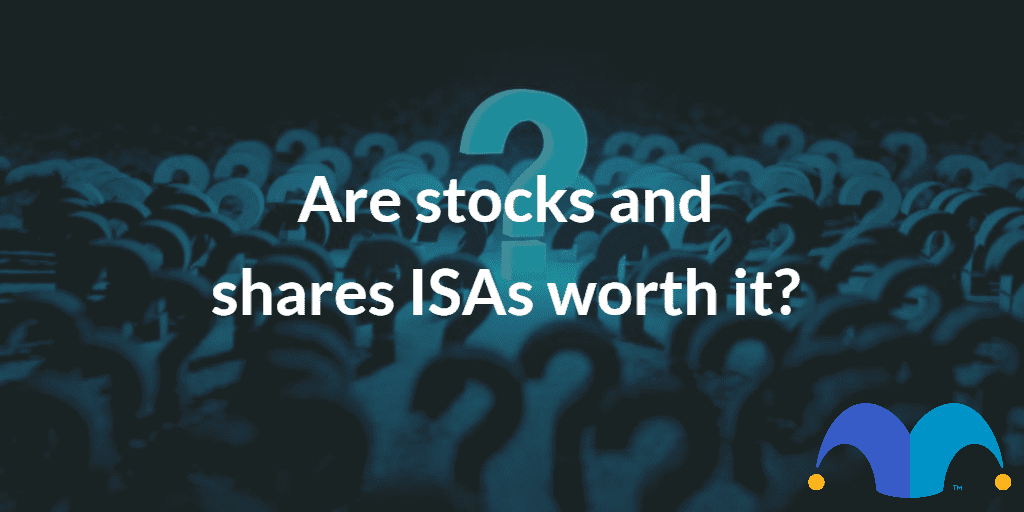- What are stocks and shares ISAs?
- How do stocks and shares ISAs differ from other ISAs?
- What are the average returns of stocks and shares ISAs?
- Why should you consider stocks and shares ISAs?
- Tax advantages
- Higher returns on your investments
- Protection against inflation
- Transferable between providers
- Protection if your provider collapses
- What are the criteria for getting one?
- Should you invest in stocks and shares ISA?
You may well have heard people talk about stocks and shares ISAs and wondered what all the fuss is about. Are stocks and shares ISAs worth it? Read on to find out.
What are stocks and shares ISAs?
Stocks and shares ISAs have a lot of benefits. They can be a really good way to start investing, and they are also used by many seasoned investors.
Essentially, they are tax-efficient investing accounts. You can invest up to £20,000 in an ISA each year without paying tax. A lot of people want to make the most of that benefit!
How do stocks and shares ISAs differ from other ISAs?
There are a lot of different types of ISAs, all of which have unique qualities. You may have heard of Lifetime ISAs or cash ISAs. These have their own benefits but generally operate very similarly to savings accounts.
Rather than simply being a savings account, a stocks and shares ISA is an investing account. You don’t hold cash, you hold stocks and shares – as the name would suggest.
What are the average returns of stocks and shares ISAs?
Like any investment, stocks and shares ISAs can go up and down in value. Over time, you’re likely to see an increase if you invest in one. While this is not guaranteed, average returns on these ISAs are very strong.
Stocks and shares ISAs have historically performed relatively well. The most recent data available — for the tax year 2021/22 — showed the average Stocks and Shares ISA returned 6.92%.1
Good for long-term, cost-conscious investors who want lots of flexibility
Interactive Investor Stocks and Shares ISA *
| Trading Commission | From £3.99‡ |
| Account Management Fee | From £4.99† |
- Pros & Cons
- Fees & Charges
Pros
- Very cheap trading costs
- Flat-rate platform fee structure
- Inclusive free trades with some plans
Cons
- No dealing fee discount for frequent trading
- Some plans can be expensive for smaller portfolios
- Limited trading tools
Interactive Investor offers three different subscription plans – these are easy to switch between at a later date, should circumstances change.
Investor Essentials plan
Platform Fees:†
Monthly subscription fee: £4.99
Equities custody charge: covered by subscription fee
Fund management charge: covered by subscription fee
Note: the ‘Investor Essentials’ plan has a £50,000 investment limit; if this is exceeded the account will automatically be upgraded to the ‘Investor’ plan.
Dealing Fees‡:
UK shares & ETFs: £3.99
US shares: £3.99
Other international shares: £9.99
UK fund trades: £3.99
Investor plan
Platform Fees:†
Monthly subscription fee: £11.99
Equities custody charge: covered by subscription fee
Fund management charge: covered by subscription fee
Dealing Fees‡:
A monthly dealing credit, worth £3.99, is included as part of the account subscription and is valid for 31 days. (Equivalent to 1 free trade per month).
Additional trades are charged as follows:
UK shares & ETFs: £3.99
US shares: £3.99
Other international shares: £9.99
UK fund trades: £3.99
Super Investor plan
Platform Fees:†
Monthly subscription fee: £19.99
Equities custody charge: covered by subscription fee
Fund management charge: covered by subscription fee
Dealing Fees‡:
A monthly dealing credit, worth £7.98, is included as part of the account subscription and is valid for 31 days. (Equivalent to 2 free trades per month).
Additional trades are charged as follows:
UK shares & ETFs: £3.99
US shares: £3.99
Other international shares: £5.99
Fund trades: £3.99
Applicable to all plans
Regular investing service: free to use (£25 minimum investment amount, no dealing fees)
Spot + FX fees: 1.5%
Telephone dealing charge: £49
Note: For UK and US trades over £100,000, and other International share trades over £25,000 additional fees and charges apply. (See the Interactive Investor website for full details.)
Why should you consider stocks and shares ISAs?
There are a lot of reasons to think about stocks and shares ISAs.
Tax advantages
Currently, stocks and shares ISAs come with significant tax advantages.
The total amount you can save in ISAs in the 2022-2023 tax year is £20,000. This ISA limit is set by the government and is subject to change from year to year.
Any money up to this limit put into ISAs is tax free. This means investors won’t have to pay any tax on dividends or gains realised while investing in stocks and shares ISAs.
The tax year runs from 6 April to 5 April. HMRC’s deadline to put money in an ISA and take advantage of your allowance in a tax year is midnight on 5 April.
Higher returns on your investments
Investing isn’t always smooth sailing, but over time investments in stocks and shares ISAs tend to increase in value.
So if you invest in this type of ISA, over time, you may well end up with more money than you originally invested.
Protection against inflation
Inflation is high at the moment. Keeping savings in cash effectively means losing money over time, particularly while interest rates are so low.
If you keep £1,000 in cash for a year, you’ll be lucky to get 0.25% interest on it. This would give you a total of £1002.50 at the end of the year.
However, let’s say inflation is 5%. For your £1,000 to be worth the same in a year’s time, you would need £1050.
While you will struggle to make this extra £50 in a savings account, a stocks and shares ISA might be able to help you out.
Transferable between providers
Stocks and shares ISAs can be moved from one provider to another without any tax-free benefits.
As long as you follow the ISA transfer rules – which your provider will be able to tell you about – you can move your ISA to a different company without losing any of the benefits you have gained during the tax year.
This gives you the freedom to shop around for better rates and lower fees, meaning you can take advantage of deals whenever you come across them.
Protection if your provider collapses
If your stocks and shares ISA provider goes out of business your money and assets are protected by the Financial Services Compensation Scheme (FSCS) as long as the provider is regulated by the Financial Conduct Authority (FCA).
Meanwhile, if the fund manager of a fund you invest in goes bust, your underlying assets will also be protected. The stocks owned by any fund are held separately by a trustee or a depositary. This means that if its fund manager goes under, then the investments in the fund are unaffected.
What are the criteria for getting one?
Most people in the UK are eligible for stocks and shares ISAs. The only criteria are that you must be:
- Aged 18 or over
- A UK resident (for tax purposes)
You can only pay into one stocks and shares ISA per tax year.
Should you invest in stocks and shares ISA?
Whether or not a stocks and shares ISA is right for you is a personal decision and will depend on your own circumstances. If you’re looking to start investing, stocks and shares ISAs are well worth considering as a starting point. Check out our top stocks and shares ISAs in the UK to get started today.
Please note that tax treatment depends on the individual circumstances of each individual and may be subject to future change. The content of this article is provided for information purposes only. It is not intended to be, nor does it constitute, any form of tax advice. Readers are responsible for carrying out their own due diligence and for obtaining professional advice before making any investment decisions.

